A lot goes into making a good sandwich. From the bread and the meats, to the cheeses, vegetables, and condiments, it's important to find that balance of flavor, texture, and quality in order to make all the components harmonize. And it's that latter aspect, the quality, that can really elevate a good sandwich to a great one—something certain American sandwich chains know well.
Both regionally and nationally, there are no shortages of restaurant chains selling sandwiches, and given the sheer abundance, it's important for these companies to differentiate themselves and stand out through the quality of their food. Anyone can make a terrible-for-you cold-cut combo, and laughably unhealthy chicken sandwiches are an unfortunate omnipresence on menus. But the brands that go the extra mile (sometimes thousands of miles to South Africa) to source top-tier ingredients are the ones assembling sandwiches you can feel good about.
From a U.K.-bred café to an organic eatery on a sustainable mission, these are the nine sandwich chains that use the highest quality ingredients in America.
And don't miss 9 Burger Chains With the Best Quality Meat In America.
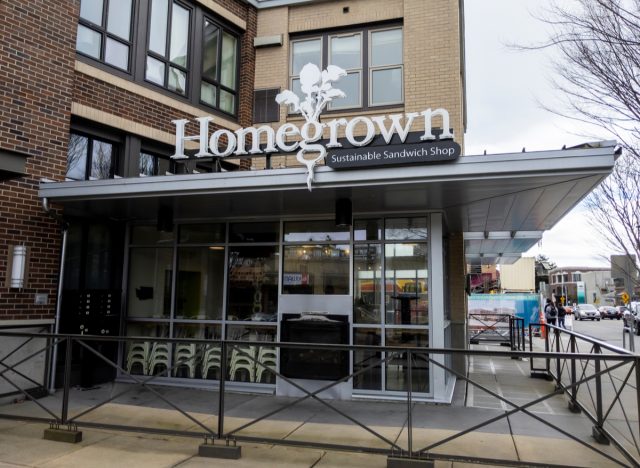
Any sandwich chain with a name like Homegrown is bound to know a thing or two about quality. Indeed, this organic eatery (with locations in San Francisco and Seattle) ranks as a standout sandwich chain on the rise, largely for how seriously it takes its ingredients.
The company operates its own farm, which it uses as a model for sustainable agriculture and as a food producer for its restaurants, supplying ingredients like broccoli for their Broccoli Melt, featuring feta, caramelized onions, and chermoula aïoli. Beyond the farm, Homegrown sources the rest of its ingredients—everything from eggs to tofu—from like-minded purveyors and farmers.
"We are passionate about changing the food system through partnerships with the best sustainable growers, ranchers, and producers around the country," says the company. "We value the ethical treatment of animals and an animal-centered approach, including animals raised on pasture. All of our meat ingredients come from ranches that use all-vegetarian diets and are nitrate-free, antibiotic-free, and hormone-free."
This also means sourcing seasonal and local produce (all grown with organic practices, to boot), working with bakery partners to assure nutritious and delicious breads made with 100% non-GMO ingredients, and procuring milk and tofu that are certified organic as well.
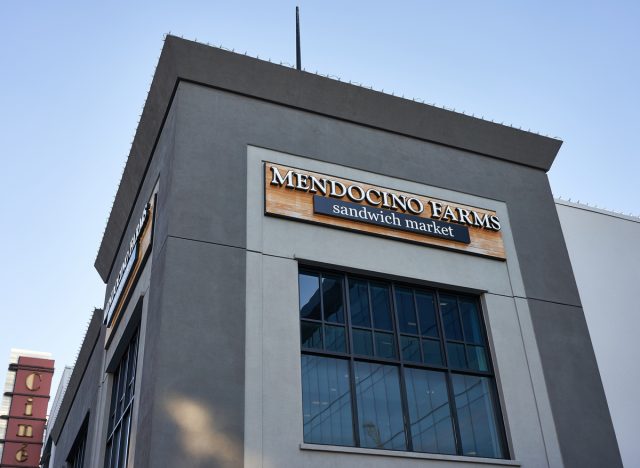
Another West Coast sandwich chain on the rise, Mendocino Farms is so adherent to quality that the company proudly put the word "farm" in its name. Known for its wholesome, fresh take on sandwiches, including the aptly dubbed "Cheffy Sandwiches" like a plant-based Reuben with corned "beef" and apple-celery slaw on panini-pressed rye, and a caramelized pork belly Banh Mi on crisp ciabatta, the chain takes every aspect of its menu seriously.
"We source each ingredient with care from farmers and food artisans who share our elevated standards for quality—working locally with our neighbors when possible," says the company. "Those high standards include no added hormones, artificial sweeteners, food dyes, or artificial flavors ever, and a commitment to environmental and social responsibility."
This means meat that's humanely raised and antibiotic-free (including free-range chicken from Pitman Farms and Petaluma Poultry), pristine produce (prioritizing small family farms), and locally sourced bread as fresh as can be.
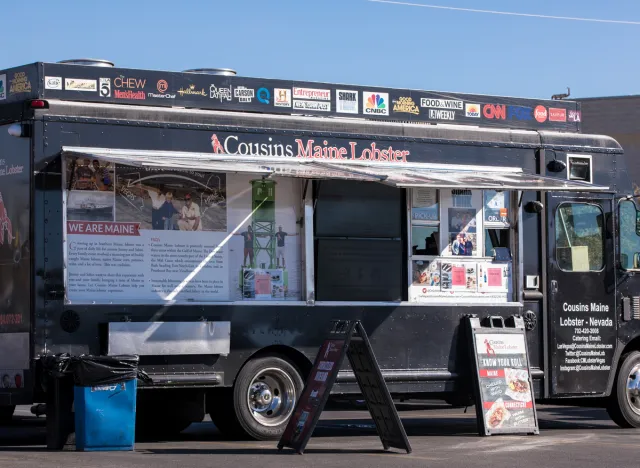
If the particular type of sandwich you're craving comes in a buttery New England split-top roll stuffed with lobster, then you can't do better than Cousins Maine Lobster. With food trucks and restaurants scattered across the country, this is a family-run company (founded by real-life cousins Jim Tselikis and Sabin Lomac) committed to spreading the gospel of good lobster, including in ocean-less markets where cravings are high, like Tennessee, Arizona, and Oklahoma.
For the company, it's all about respect and love for this prized ingredient. "Lobster is a special product from a special place in the world," says Cousins' Annie Tselikis, herself a longtime member of the lobster industry. "The commercial lobster fishery extends from the mid-Atlantic in the USA through the East Coast of Canada. In any given year, Maine fishermen land roughly 85-90% of the total volume produced in the United States, typically about 100 million pounds per year. This is still very much an artisanal fishery and everything from fishing to adding value happens by hand."
Cousins' procurement team in Maine works closely with its partners, who purchase and prepare lobster to their specifications, allowing them to provide the Cousins Maine Lobster family with a premium quality product.
"We are first and foremost committed to sourcing products that come from sustainable fisheries and support sustainable economies," Tselikis adds. "The Maine lobster industry is the backbone of the islands and coastal towns in our home state and we know how critical it is for those communities. Our food trucks and restaurants are directly connected to the fishermen in Portland, Harpswell, Stonington, and beyond. It is a mutually beneficial relationship: without premium, wild-caught lobster from Maine, there would be no Cousins Maine Lobster and with the growth of our brand nationwide we have increased the demand for this iconic product and brought more value into the fishery and the supply chain."
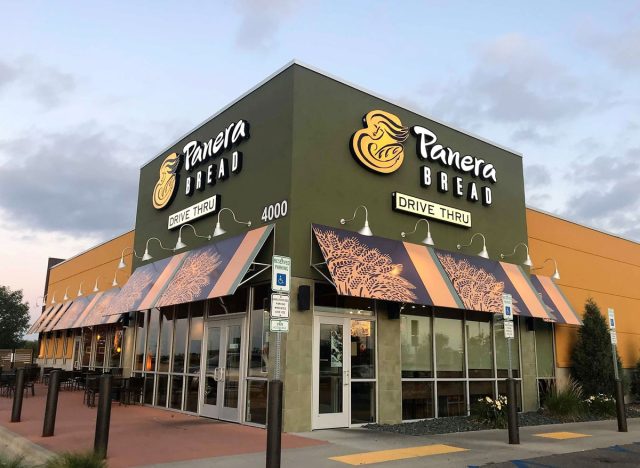
Between its new look, its new subscription program, and the fact that it's on a nationwide expansion tear, Panera Bread is at the forefront of America's better-for-you restaurant chain landscape.
"Creating meals with fresh, seasonal ingredients is what gives our food that fresh-from-the-field flavor," says the company. "We've been forging strong relationships with our farmers and producers for years—people who are as passionate about quality and safety as we are—allowing us to bring high-quality ingredients to our guests. We source most of our ingredients from North America, but we'll venture beyond our continent in search of special ingredients that add a distinctive flavor."
For example, Panera sources peppadew peppers from South Africa for their Mediterranean veggie sandwiches, proof that they're more than willing to go that extra mile(s).
In addition to publishing an extensive animal welfare statement on its website, along with elaborate yearly responsibility reports, the company has what it calls its "No No List," which sets strict standards for ingredients and additives that aren't allowed in its food (spoiler alert: there are a lot of ingredients on the list). It's all about a commitment to quality and clean eating for the company, which says, "If an ingredient can't meet our standards for clean, we simply don't put it in our pantry."
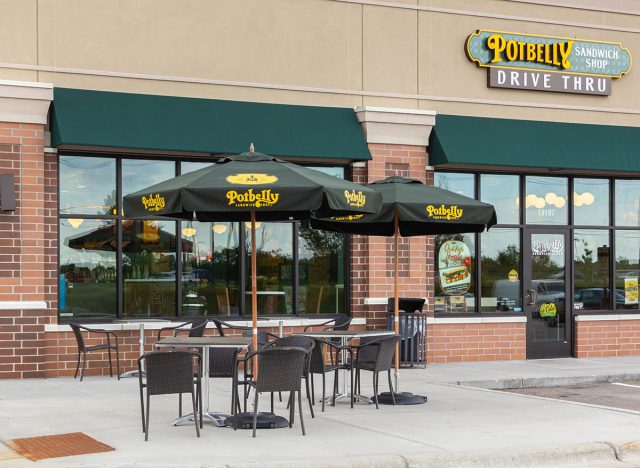
It looks like the tides are shifting for Potbelly. The Illinois-based chain, which was once hemorrhaging customers, is now poised to make a major comeback this year, and at least part of that growth can be attributed to a growing demand for quality ingredients—the kind that these sandwich-slingers value.
From its folksy, rustic decor to its transparent nutrition information, there's lots to find endearing about this place that's known for its wholesome breads and hand-sliced meats. "We're passionate about serving fresh, crave-worthy food made with high-quality ingredients," says the company, which uses the highest quality all-white breast meat chicken—free of artificial colors, flavors, or preservatives—for its sandwiches and salads.
For all other meats and produce, in general, Potbelly sources ingredients from reputable suppliers that comply with food safety regulations. The company offers a detailed nutrition page on its website, offering forthright detail on its breads (vegan, except for the honey-kissed multi-grain), meats (all hand-sliced in-house), and cheeses (pasteurized), and even launched Potbelly Pantry at the onset the pandemic, which not only allowed customers to DIY their own Potbelly-style sandwiches at home, but also to see first-hand the quality of ingredients that go into them.
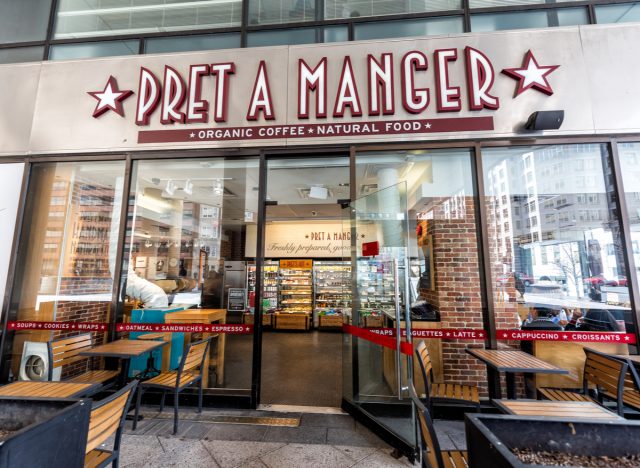
Sustainability, charity, and environmental impact are all key tenets for this U.K.-born chain, which has swept through the U.S. in recent years. And at the heart of all of these practices is attention to quality—from providing a quality working environment to practicing quality social governance, and of course, using quality ingredients for its sandwich-centric menu.
All food is freshly made throughout the day, and whatever is left over gets donated to local charities through the chain's own non-profit, The Pret Foundation. In terms of its high-standard ingredients, these include 100% organic coffee and farm-fresh produce and meats.
In 2017, the company received a Cage Free Award for its commitment to improving animal welfare. Pret also has what it calls "Passion Facts," which are informative photographs in all of its stores detailing facts about the company and its food, like the fact that they actually grill their chicken (rather than score the meat with artificial grill marks, as is often the case elsewhere).
Eschewing hulking sandwiches for more reasonable portion sizes, and taking a quality over quantity approach, makes Pret a Manger a place for a wholesome meal.
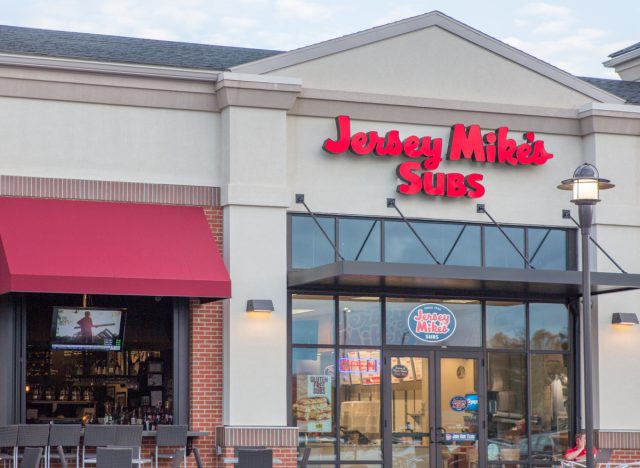
When it comes to subs, Jersey Mike's is at the top of the list. While not every sandwich on the menu is the picture of health, you can take solace in the fact that the chain recently committed to a "no antibiotics ever" (NAE) policy after initially starting with antibiotic-free turkey in 2017.
That means all pork products adhere to "Farm Promise," which means they come from healthy and happy pigs raised in an open group environment without crates, hormones, or steroids. "All of Jersey Mike's pork comes from family farms in the United States where farmers care deeply about the welfare of their animals, raising them in a safe, nurturing environment," says Kiersten Hafer, vice president of marketing for Clemens Food Group, which supplies Jersey Mike's with ham.
That same diligence applies to every facet of the chain's menu, from its fresh bread to its high-quality rib-eye for cheese steaks and deli meats sliced fresh right in front of the customer.
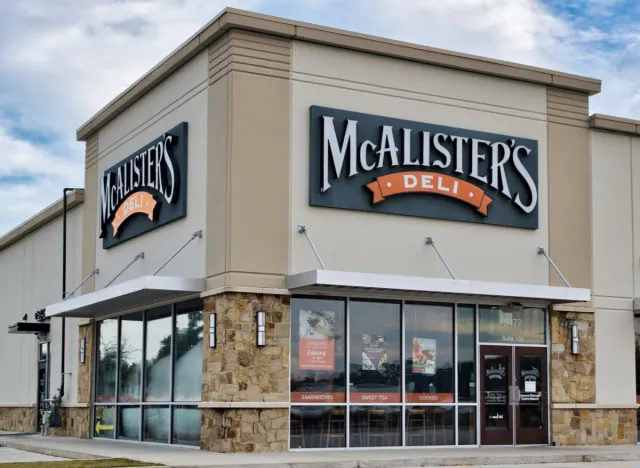
No matter how prolific they become, there's something so quaint and homey about McAlister's Deli, a widespread chain known for sandwiches that are at once hearty and wholesome, made with ingredients you can actually recognize.
That's because since opening in 1989, the company's stayed true to its beliefs. "Not only has our menu remained true to its roots, so have our values. Today, with more than 400 restaurants in 28 states, we're still dedicated to serving great food with genuine hospitality," the company states on its website.
This ethos includes sourcing produce from local farms as much as possible, using exclusively Idaho Russet potatoes, and Rainforest Alliance Certified black tea that's sweetened with pure cane sugar. "We're committed to serving food that is not only craveable, but created with the finest and freshest ingredients."
"ingredients" - Google News
May 12, 2022 at 12:43AM
https://ift.tt/tI8vCYE
8 Sandwich Chains That Use the Highest Quality Ingredients — Eat This Not That - Eat This, Not That
"ingredients" - Google News
https://ift.tt/nuSLi7B
Shoes Man Tutorial
Pos News Update
Meme Update
Korean Entertainment News
Japan News Update
Bagikan Berita Ini















0 Response to "8 Sandwich Chains That Use the Highest Quality Ingredients — Eat This Not That - Eat This, Not That"
Post a Comment